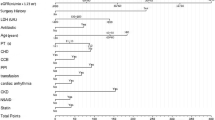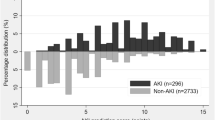Abstract
Background
To investigate the factors associated with acute kidney injury (AKI) in postoperative colorectal cancer (CRC) patients and develop a risk prediction model.
Methods
The clinical data of 389 CRC patients were retrospectively analyzed. The patients were divided into AKI (n = 30) and non-AKI groups (n = 359) according to KDIGO diagnostic criteria. Demographic data, the presence of underlying diseases, perioperative conditions and related examination results were compared between the two groups. Binary logistic regression was used to analyze the independent risk factors for postoperative AKI, and a risk prediction model was established. And a verification group (94 patients) was used to verify the model.
Results
30 patients (7.71%) with CRC had postoperative AKI. Binary logistic regression analysis showed that preoperative combined hypertension, preoperative anemia, inadequate intraoperative crystalloid infusion, low intraoperative minimum mean arterial pressure (MAP) and moderate to severe postoperative decline in hemoglobin (Hb) levels were independent risk factors. The risk prediction model developed was expressed as Logit P = − 0.853 + 1.228 * preoperative combined hypertension + 1.275 *preoperative anemia − 0.002 * intraoperative crystalloid infusion (ml) − 0.091 * intraoperative minimum MAP (mmHg) + 1.482 * moderate to severe postoperative decline in Hb levels. In Hosmer–Lemeshow test, χ2 = 8.157, P = 0.718 showed that the fitting effect was good. The area under ROC curve was 0.776 (95% CI 0.682–0.871, P < 0.001), with a prediction threshold of 1.570, a sensitivity of 63.3% and a specificity of 88.9%. The sensitivity and specificity of the verification group were 65.8% and 86.1%.
Conclusions
Preoperative combined hypertension, preoperative anemia, inadequate intraoperative crystalloid infusion, low intraoperative minimum MAP, and moderate to severe postoperative decline in Hb levels were independent risk factors for AKI development in CRC patients. The prediction model can effectively predict the occurrence of postoperative AKI in patients with CRC.

Similar content being viewed by others
Availability of data and materials
Upon reasonable request, data and methodology can be shared. All data are available from the author.
References
Baidoun F, Elshiwy K, Elkeraie Y et al (2021) Colorectal cancer epidemiology: recent trends and impact on outcomes. Curr Drug Targets 22:998–1009. https://doi.org/10.2174/1389450121999201117115717
Cho YA, Lee J, Oh JH et al (2019) Genetic risk score, combined lifestyle factors and risk of colorectal cancer. Cancer Res Treat 51:1033–1040. https://doi.org/10.4143/crt.2018.447
Deng Y (2017) Rectal cancer in Asian vs. western countries: why the variation in incidence. Curr Treat Options Oncol 18:64. https://doi.org/10.1007/s11864-017-0500-2
Tsoi KK, Hirai HW, Chan FC, Griffiths S, Sung JJ (2017) Cancer burden with ageing population in urban regions in China: projection on cancer registry data from World Health Organization. Br Med Bull 121:83–94. https://doi.org/10.1093/bmb/ldw050
Gameiro J, Agapito Fonseca J, Jorge S, Lopes JA (2018) Acute kidney injury definition and diagnosis: a narrative review. J Clin Med. https://doi.org/10.3390/jcm7100307
Slagelse C, Gammelager H, Iversen LH, Sørensen HT, Christiansen CF (2019) Acute kidney injury and 1-year mortality after colorectal cancer surgery: a population-based cohort study. BMJ Open 9:e024817. https://doi.org/10.1136/bmjopen-2018-024817
Kee YK, Kim H, Jhee JH et al (2019) Incidence of and risk factors for delayed acute kidney injury in patients undergoing colorectal surgery. Am J Surg 218:907–912. https://doi.org/10.1016/j.amjsurg.2019.03.027
Khwaja A (2012) KDIGO clinical practice guidelines for acute kidney injury. Nephron Clin Pract 120:c179-184. https://doi.org/10.1159/000339789
Maremonti F, Meyer C, Linkermann A (2022) Mechanisms and models of kidney tubular necrosis and nephron loss. J Am Soc Nephrol 33:472–486. https://doi.org/10.1681/ASN.2021101293
Kellum JA, Prowle JR (2018) Paradigms of acute kidney injury in the intensive care setting. Nat Rev Nephrol 14:217–230. https://doi.org/10.1038/nrneph.2017.184
Gumbert SD, Kork F, Jackson ML et al (2020) Perioperative acute kidney injury. Anesthesiology 132:180–204. https://doi.org/10.1097/ALN.0000000000002968
Bian A, Shi M, Flores B et al (2017) Downregulation of autophagy is associated with severe ischemia-reperfusion-induced acute kidney injury in overexpressing C-reactive protein mice. PLoS One 12:e0181848. https://doi.org/10.1371/journal.pone.0181848
Scholz H, Boivin FJ, Schmidt-Ott KM et al (2021) Kidney physiology and susceptibility to acute kidney injury: implications for renoprotection. Nat Rev Nephrol 17:335–349. https://doi.org/10.1038/s41581-021-00394-7
Ghincea CV, Reece TB, Eldeiry M et al (2019) Predictors of acute kidney injury following aortic arch surgery. J Surg Res 242:40–46. https://doi.org/10.1016/j.jss.2019.03.055
Hosohata K, Jin D, Takai S (2021) In vivo and in vitro evaluation of urinary biomarkers in ischemia/reperfusion-induced kidney injury. Int J Mol Sci. https://doi.org/10.3390/ijms222111448
Goren O, Matot I (2015) Perioperative acute kidney injury. Br J Anaesth 115(Suppl 2):ii3-14. https://doi.org/10.1093/bja/aev380
Lee KC, Chung KC, Chen HH, Cheng KC, Wu KL, Song LC (2022) The impact of obesity on postoperative outcomes in colorectal cancer patients: a retrospective database study. Support Care Cancer 30:2151–2161. https://doi.org/10.1007/s00520-021-06626-7
Argalious MY, Makarova N, Leone A, Cywinski J, Farag E (2017) Association of body mass index and postoperative acute kidney injury in patients undergoing laparoscopic surgery. Ochsner J 17:224–232
Li N, Qiao H, Guo JF et al (2019) Preoperative hypoalbuminemia was associated with acute kidney injury in high-risk patients following non-cardiac surgery: a retrospective cohort study. BMC Anesthesiol 19:171. https://doi.org/10.1186/s12871-019-0842-3
Perazella MA (2019) Drug-induced acute kidney injury: diverse mechanisms of tubular injury. Curr Opin Crit Care 25:550–557. https://doi.org/10.1097/MCC.0000000000000653
Wang H, Ji X, Wang AY et al (2021) Epidemiology of sepsis-associated acute kidney injury in Beijing, China: a descriptive analysis. Int J Gen Med 14:5631–5649. https://doi.org/10.2147/IJGM.S320768
Yaegashi M, Otsuka K, Kimura T et al (2020) Early renal dysfunction after temporary ileostomy construction. Surg Today 50:703–710. https://doi.org/10.1007/s00595-019-01938-y
Funding
This work was supported by the Advanced Programs for the Returned Overseas Chinese Scholars of Henan Province with Grant number 2017-9.
Author information
Authors and Affiliations
Corresponding author
Ethics declarations
Conflict of interest
The authors declare no competing financial interests.
Research involving human participants and/or animals, and Informed consent
This study was approved by the ethics committees of the Affliated Cancer Hospital of Zhengzhou University & Henan Cancer Hospital, Zhengzhou, China. Due to the retrospective nature of the study and because no patient specimens were used, the requirement for informed consent was waived by the ethics committees. So the patients signed informed consents form that we created (unofficially).
Consent for publication
Not applicable.
Additional information
Publisher's Note
Springer Nature remains neutral with regard to jurisdictional claims in published maps and institutional affiliations.
Rights and permissions
Springer Nature or its licensor (e.g. a society or other partner) holds exclusive rights to this article under a publishing agreement with the author(s) or other rightsholder(s); author self-archiving of the accepted manuscript version of this article is solely governed by the terms of such publishing agreement and applicable law.
About this article
Cite this article
Li, L., Wan, X., Zhang, Y. et al. Analysis of factors associated with postoperative acute kidney injury in patients with colorectal cancer and the development of a risk prediction model: a retrospective study. Updates Surg 75, 1171–1178 (2023). https://doi.org/10.1007/s13304-023-01481-z
Received:
Accepted:
Published:
Issue Date:
DOI: https://doi.org/10.1007/s13304-023-01481-z




